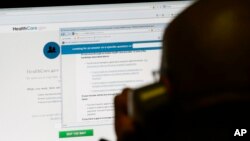More than six million Americans are now enrolled in new health insurance coverage in the United States, but the law mandating health care reforms throughout the country remains as controversial as when Congress approved it four years ago.
Most U.S. workers receive health insurance at their workplace that is largely paid for by their employers. But those who do not have such coverage faced a Monday deadline to start buying insurance or pay a financial penalty that could equal 1 percent of their salaries.
Congress approved the massive overhaul of U.S. health care in 2010. It remains as President Barack Obama's signature legislative achievement, although many of the reforms are just now taking shape.
But only his Democratic colleagues voted for it and most Republicans remain adamantly opposed to it. They especially object to the requirement to buy insurance, which they consider an infringement on personal liberties.
The Republican-controlled House of Representatives has voted more than 50 times to repeal it, measures ignored and left to die in the Democratic-run Senate.
The new health insurance was first offered in October, but the government's Internet enrollment site was ill-equipped to handle would-be customers, leading to massive delays and widespread complaints. Most of the technical glitches appear to have been fixed and enrollment soared as Monday's deadline approached.
But even on the last day, people using the website were greeted with a message that it was down for maintenance.
Senate Democratic leader Harry Reid lauded the law's goal of providing more people with insurance, often with government subsidies.
"The rollout was really bad," he said. "But let's look at what's happened since that. We have millions of people who have signed up. Millions!"
The law is popularly known in the U.S. as Obamacare, and surveys show voters more opposed to it than not. But many people like some of the reforms, such as a ban on private insurers denying coverage to someone with a pre-existing condition requiring costly medical care.
The law is aimed at greatly increasing the number of people covered by health insurance in the country, and the government estimates about 25 million more people could have insurance by 2016. That would leave about 9 percent without insurance, partly because some states have refused to expand coverage for the poor.
The more than six million people enrolled in new insurance plans has come close to the original estimate that seven million people would sign up by Monday's deadline.
The U.S. Supreme Court ruled the law constitutional in 2012. But numerous challenges to specific provisions of the law are being heard throughout the U.S. court system, and the Supreme Court heard one such case last week. It expects to rule by June whether employers with religious objections to the law are required to provide contraceptives for their female workers.
Most U.S. workers receive health insurance at their workplace that is largely paid for by their employers. But those who do not have such coverage faced a Monday deadline to start buying insurance or pay a financial penalty that could equal 1 percent of their salaries.
Congress approved the massive overhaul of U.S. health care in 2010. It remains as President Barack Obama's signature legislative achievement, although many of the reforms are just now taking shape.
But only his Democratic colleagues voted for it and most Republicans remain adamantly opposed to it. They especially object to the requirement to buy insurance, which they consider an infringement on personal liberties.
The Republican-controlled House of Representatives has voted more than 50 times to repeal it, measures ignored and left to die in the Democratic-run Senate.
The new health insurance was first offered in October, but the government's Internet enrollment site was ill-equipped to handle would-be customers, leading to massive delays and widespread complaints. Most of the technical glitches appear to have been fixed and enrollment soared as Monday's deadline approached.
But even on the last day, people using the website were greeted with a message that it was down for maintenance.
Senate Democratic leader Harry Reid lauded the law's goal of providing more people with insurance, often with government subsidies.
"The rollout was really bad," he said. "But let's look at what's happened since that. We have millions of people who have signed up. Millions!"
The law is popularly known in the U.S. as Obamacare, and surveys show voters more opposed to it than not. But many people like some of the reforms, such as a ban on private insurers denying coverage to someone with a pre-existing condition requiring costly medical care.
The law is aimed at greatly increasing the number of people covered by health insurance in the country, and the government estimates about 25 million more people could have insurance by 2016. That would leave about 9 percent without insurance, partly because some states have refused to expand coverage for the poor.
The more than six million people enrolled in new insurance plans has come close to the original estimate that seven million people would sign up by Monday's deadline.
The U.S. Supreme Court ruled the law constitutional in 2012. But numerous challenges to specific provisions of the law are being heard throughout the U.S. court system, and the Supreme Court heard one such case last week. It expects to rule by June whether employers with religious objections to the law are required to provide contraceptives for their female workers.











